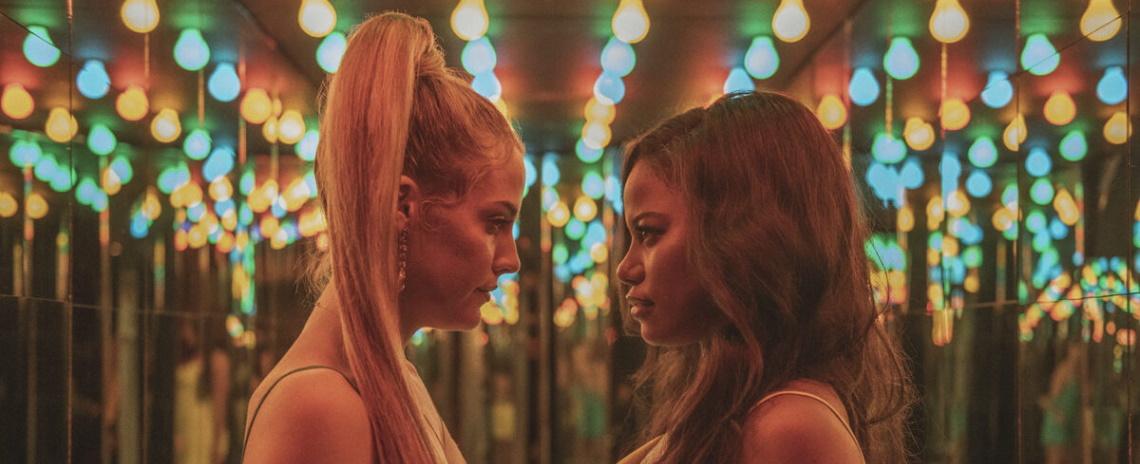Director Janicza Bravo’s second feature, the dynamic and engrossing Zola, carries an onscreen title of @zola – in a pink font so hyperpop that Hannah Diamond would grow heart-eyes. The social media handle-as-title is apt: The machine behind Zola purports it to be the first film based on a Twitter thread, and on subsequent reporting from the likes of Rolling Stone. “Y’all wanna hear a story about why me & this [expletive deleted] here fell out???????? It’s kind of long but full of suspense [tear laughing emoji] [tear streaming emoji]” is the first tweet of a 148-post saga coming from the real “Zola,” the stage name of dancer A’Ziah King, whose Twitter account @_zolarmoon had quite the following at the time.
That meme-able post also constitutes the first lines of dialogue in Bravo’s adaptation, co-written by her and up-and-coming playwright Jeremy O. Harris (of Broadway sensation Slave Play). Under this narration by Zola (Taylour Paige), she and flash-in-a-pan BFF Stefani (Riley Keough) face off in a fantasy liminal space that resembles the candy-colored stripclub version of the hall of mirrors in Welles’ The Lady from Shanghai. An infinity of Zolas exist here — even beyond the several meta-textual versions already present. The scene is a bold thesis statement and an illuminating one, for Zola is as much about the titular character’s deeply disturbing road trip with Stefani, her “roommate” X (Colman Domingo), and her boyfriend Derrek (Nicholas Braun) as it is about the splintering and creation of Self in the Age of the Internet.
All the players take turns at identity charades. Braun is the naive and pitiful try-hard Derrek, the White trash version of the equally naive and try-hard Cousin Greg he portrays on HBO’s Succession. Regarding the true mission behind the group’s journey to Tampa, Flor., Derrek is almost as in the dark as Zola, but he attempts to play it cool when meets an all-too-friendly interloper in the parking lot of their seedy motel. X, who turns out to be Stefani’s pimp, flip-flops between Caribbean Patois-inflected charmer and more locally-accented psychopath. Only Domingo could elicit queasy forgiveness after executing a 180-degree turn into an emotionally and physically violent creep.
Keough is tasked with a different kind of noxious character, and she makes it credibly stomach-churning and cringe-inducing funny. The White Stefani is an AAVE-cribbing, Fashion Nova-donning minstrel show clown. This persona is one way she charms the Black Zola so quickly, along with the flashes of what can appear to be sincere sensitivity. They have so much in common, culturally, personally, and professionally, but this identification is a ruse.
In a macro-context, Stefani is exercising her White privilege. With Zola specifically, it’s an act of manipulation to coerce her into sex work beyond her comfort zone. The ploy works – to a point. Zola finds herself trapped in an upscale hotel suite awaiting johns arranged for the two women by a Backpages ad sneakily created by X and Stefani. “I wanted the White one,” their first customer sneers as he does a once-over on Zola. Stefani makes 150 bucks from the session, during which Zola is uncomfortably cornered and desperately trying to find a way out. When it’s finally done, she’s dismayed at the amount earned: “P***y is worth thousands.” Zola then exerts the kind of power she can in the situation. She becomes a director of online performance and Stefani’s new, more empowering pimp, remaking her in the image of “Hit Me Baby (One More Time)” Britney Spears for an updated listing with a higher asking price.
They total eight grand by sunrise, but at what cost? Paige, who’s had smaller roles in White Boy Rick (2018) and Ma Rainey’s Black Bottom (2020), nimbly bears the weight of the identity politics inherent in this, her first major leading role. The commanding yet effusive performer centers Zola, who’s already at the front lines of many cultural and political battles as a young Black female sex worker. In fact, she’s the reason Zola works when the satire-cum-crime drama occasionally dips into bad impulses similar to American satirist Alexander Payne. As Zola veers closer into horror territory, the mix of Payne-ian character mockery and nauseating dread never quite settles, causing some wince-inducing missteps while Bravo attempts to tighten her narrative screws.
The reductive equation is that Zola is Payne remaking another girls-gone-wild Florida road trip, Harmony Korine’s Spring Breakers. Like that 2013 zeitgeist-tapper, Bravo’s similarly neon-lit piece of pop art is keenly aware of how outside forces shape the inside. Her characters’ online projections often clash and violently assimilate within their offline realities. Rarely does the director let the visuals of iMessage threads and social media apps — a tired cliche decades into a Web-centered culture — take over her expressive images. Instead, the byproducts of the phone screens intrude elsewhere: their blueish glow illuminates the unflattering angles at which people text each other; the bird sounds from the bird app pervade the Soundcloud rap-heavy soundtrack; and an Apple-like timestamp announces the story’s time jumps.
Bravo and crew have crafted a work that has the potential of galvanizing a cult similar to devotees of Korine’s masterpiece (Spring break forever...), but a decade’s remove might not be as forgiving to her time-capsule screed. However, despite its own brand of excess and hyper-specific timeliness, Zola will persist because it is sharp and smart. Bravo’s How We Live Now essay is just not quite a Spring awakening.
Rating: B
Zola is now playing in select theaters.


